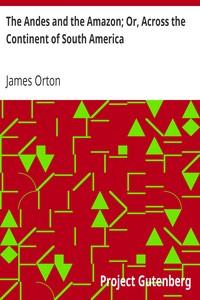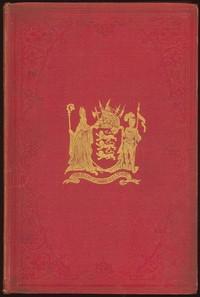|
|
Read this ebook for free! No credit card needed, absolutely nothing to pay.Words: 95960 in 24 pages
This is an ebook sharing website. You can read the uploaded ebooks for free here. No credit cards needed, nothing to pay. If you want to own a digital copy of the ebook, or want to read offline with your favorite ebook-reader, then you can choose to buy and download the ebook.

: The Andes and the Amazon; Or Across the Continent of South America by Orton James - Natural history South America; Amazon River Description and travel; Ecuador Description and travel; Andes Description and travel South America@FreeBooksTue 06 Jun, 2023 Quitonians put us to shame by their unequaled courtesy, cordiality, and good-nature, and are not far below the grave and decorous Castilian in dignified politeness. A newly-arrived foreigner is covered with promises: houses, horses, servants, yea, every thing is at his disposal. But, alas! the traveler soon finds that this ceremony of words does not extend to deeds. He is never expected to call for the services so pompously proffered. So long as he stays in Quito he will not lose sight of the contrast between big promise and beggarly performance. This outward civility, however, is not hypocritical; it is mere mechanical prattle; the speaker does not expect to be taken at his word. The love of superlatives and the want of good faith may be considered as prominent characteristics. "The readiness with which they break a promise or an agreement can only be equaled by the sophistical ingenuity with which they defend themselves for having done so." The Quitonians, who are sensible of their shortcomings, have this standing apology: "Our vices we owe to Spain; our virtues to ourselves." One can form his own judgment of the spiritless people from the single statement which we have from Dr. Jameson, that during the last forty years not ten Quitonians have visited the grand crater of Pichincha, though it is possible to ride horseback to its very edge. Plenty of gentlemen by profession walk the streets and cathedral terrace, proud as a Roman senator under his toga, yet not ashamed to beg a cup of coffee at the door of a more fortunate fellow-citizen. Society is in a constant struggle between ostentation and want. Nature has done more for Ecuador than for Ecuadorians. She laid out this beautiful valley for an Elysian field; "de Quito al Cielo" is not an empty adage; and it is painful to look upon tottering walls and impassable roads, upon neglected fields and an idle population--poor as poverty in the lap of boundless natural wealth. The only really live man in the republic is the president, Se?or G. Garcia Moreno, a man of wide views and great energy, standing in these respects head and shoulders above his fellow-citizens. Quito and Quito Valley owe nearly all their improvements to this one man. The unstable condition of the country does not encourage great undertakings; all business is periodically paralyzed by revolution. Merchants generally buy their goods in Lima, to which city and Guayaquil the fabrics of England and France are brought by foreigners in foreign ships. The shops of Quito, as we have remarked, are very small, without windows, and with only one wooden door. The door is double, and is fastened by a ponderous padlock. They are open from 7 A.M. till sunset, excepting between nine and ten and between three and four, when the stores are closed for breakfast and dinner; the merchants never trusting their clerks, even when they have any, which is not usually the case. They have no fixed price, but get what they can. The majority know nothing of wholesale, and refuse to sell by the quantity, fearing a cheat. An Indian woman will sell you a real's worth of oranges any number of times, but she would object to parting with a dollar's worth--her arithmetic can not comprehend it. Nearly the only sign of progress is the late introduction of the grape and silk-worm; and these give so much promise of success that the threadbare nobility have already begun to count their coming fortunes. Husbandry is more pastoral than agricultural. Thousands of cattle are raised on the paramos, but almost wholly for beef. "A dislike to milk , or at least the absence of its use before the arrival of Europeans, was, generally speaking, a feature common to all nations of the New Continent, as likewise to the inhabitants of China." Some cheese and a little butter are made, but in the patriarchal style. Only one American churn is in operation; the people insist upon first boiling the milk and then stirring with a spoon. Custom is omnipotent here, and its effects hereditary. Milking is done at any hour of the day, or whenever milk is wanted. The operation is a formidable one to these bull-fighting people. Stopping at a hacienda near Pelil?o for a drink of milk, we were eye-witness of a comical sight. A mild-looking cow was driven up to the door; the woman, evidently the bravest member of the household, seized the beast by the horns; a boy tied the hind legs with a long rope, and held on to one end of it at a respectful distance; while the father, with outstretched arms, milked into a calabash. Agricultural machinery is not in use. The first threshing-machine Quito ever saw was made in 1867 by some California miners, but it remained unsold when we last saw it. The spade is not known; the nearest approach to it is a crowbar flattened at one end. Hoes are clumsy and awkward. Yankee plows are bought more as curiosities than for use. Many a crooked stick is seen scratching the land, as in Egypt, which the cattle drag by their horns. Sometimes a number of sharp-nosed hogs are tied together and let into a field, and driven from place to place till the whole is rooted up. Corn is planted by making holes in the ground with a stick, and dropping in the seed. The soil and climate of Ecuador, so infinitely varied, offer a home to almost every useful plant. The productions of either India could be naturalized on the lowlands, while the highlands would welcome the grains and fruits of Europe. But intertropical people do not subdue nature like the civilized men of the North; they only pick up a livelihood. Spanish Americans, like Castilians on the banks of the Tagus, have a singular antipathy to trees. When Garcia Moreno made a park of the dusty Plaza Mayor, he was ridiculed, even threatened. To plant a fruit or shade tree in a land where people live for self, and from hand to mouth, is considered downright folly in theory and practice. A large portion of the valley, left treeless, is becoming less favorable for cultivation. Yet, as it is, the traveler is charmed by the emerald verdure of the coast, and by "evergreen Quito"--more beautiful than the hanging gardens of Babylon--suspended far above the ordinary elevation of the clouds. In the San Francisco market we find wheat, barley, maize, beans, peas, potatoes, cabbages, beets, salads, pine-apples, chirimoyas, guavas, oranges, lemons, pears, quinces, peaches, apricots, melons, and strawberries--the last all the year round. Most of these are exotics; the early discoverers found not a cereal grain of the Old World, not an orange or apple, no sugar-cane or strawberries. There is but little manufacturing industry in the interior of Ecuador, but much more than on the coast. The chief articles manufactured are straw hats, shoes, baskets, carpets, embroidery, tape, thread, ponchos, coarse woolen and cotton cloth, saddles, sandals, soap, sugar, cigars, aguardiente, powder, sweetmeats, carved images, paints, and pottery. Wines, crockery, glassware, cutlery, silks, and fine cloth are imported. There are three cotton mills in the country; one in Chillo , another in Otovalo , and a third in Cuenca . The machinery of the Chillo factory came from England; that of Otovalo from Patterson, N.J. The latter was utterly destroyed in the late great earthquake, and the proprietor killed. The cotton is inferior to that of New Orleans; it is not "fat," as mechanics say; the seeds yield only two per cent. of oil. But it is whiter than American cotton, though coarse, and can be used only for very ordinary fabrics. The average length is five eighths of an inch. One pod will produce on an average three pennyweights. The mills of Chillo and Otovalo consume 425,000 pounds annually. The first sugar-mill was erected by the Aguirres in 1840 at Nanegal. Quito is more than a century behind this age of steam and lightning. To form an adequate idea of the mechanic and fine arts in that "city of the kings," we must transport ourselves to the Saxon period of European civilization. Both the material and the construction of the houses would craze Sir Christopher Wren. With fine quarries close at hand, they must build with mud mixed with stones, or plastered on wattles, like the Druses of Mount Lebanon. Living on the equatorial line and on the meridian so accurately measured by the highest mathematics of France and Spain, Quitonians must needs leave out every right angle or straight line in the walls, and every square beam and rafter. Except on the grand road from Quito to Ambato, commenced by President Moreno, there is not a wheel-barrow to be seen; paving-stones, lime, brick, and dirt, are usually carried on human backs. Saint Crispin never had the fortitude to do penance in the shoes of Quito, and the huge nails which enter into the hoofs of the quadrupedants remind one of the Cyclops. There are not six carts in Quito. If you wish to move, you must coax a dozen Indians, who care little for your money or your threats. Horse-hire, peonage, and most mechanical work must be paid for in advance. Carriages--antique vehicles, of which there are two or three in the city--are drawn by mules. The first was introduced by Se?or Aguirre so late as 1859, and he was fined by the police for the privilege of riding in it. Quitonians are not a traveling people, and they are painfully ignorant of their own country. The most enterprising merchant ignores every thing but Quito and the road to Guayaquil. We can not praise the musical talent of Spanish Americans; their intonation is too nasal, while in their jumpings and chirpings they take after the grasshopper. A resident Englishman, who has traveled in many countries, and sings the songs of nearly every nation, told us he could not remember one of Ecuador. Pianos they have brought over the mountains at great expense; but they are more at home with the guitar. The embroidery and lace, wood carving and portrait painting of Quito, are commendable; but the grandeur of the Andes, like the beauty of the Alps, was never sketched by a native. Free books android app tbrJar TBR JAR Read Free books online gutenberg More posts by @FreeBooks
: Rebel Raider by Piper H Beam - Historical fiction; United States History Civil War 1861-1865 Fiction; Mosby John Singleton 1833-1916 Fiction US Civil War@FreeBooksTue 06 Jun, 2023
|
Terms of Use Stock Market News! © gutenberg.org.in2025 All Rights reserved.






